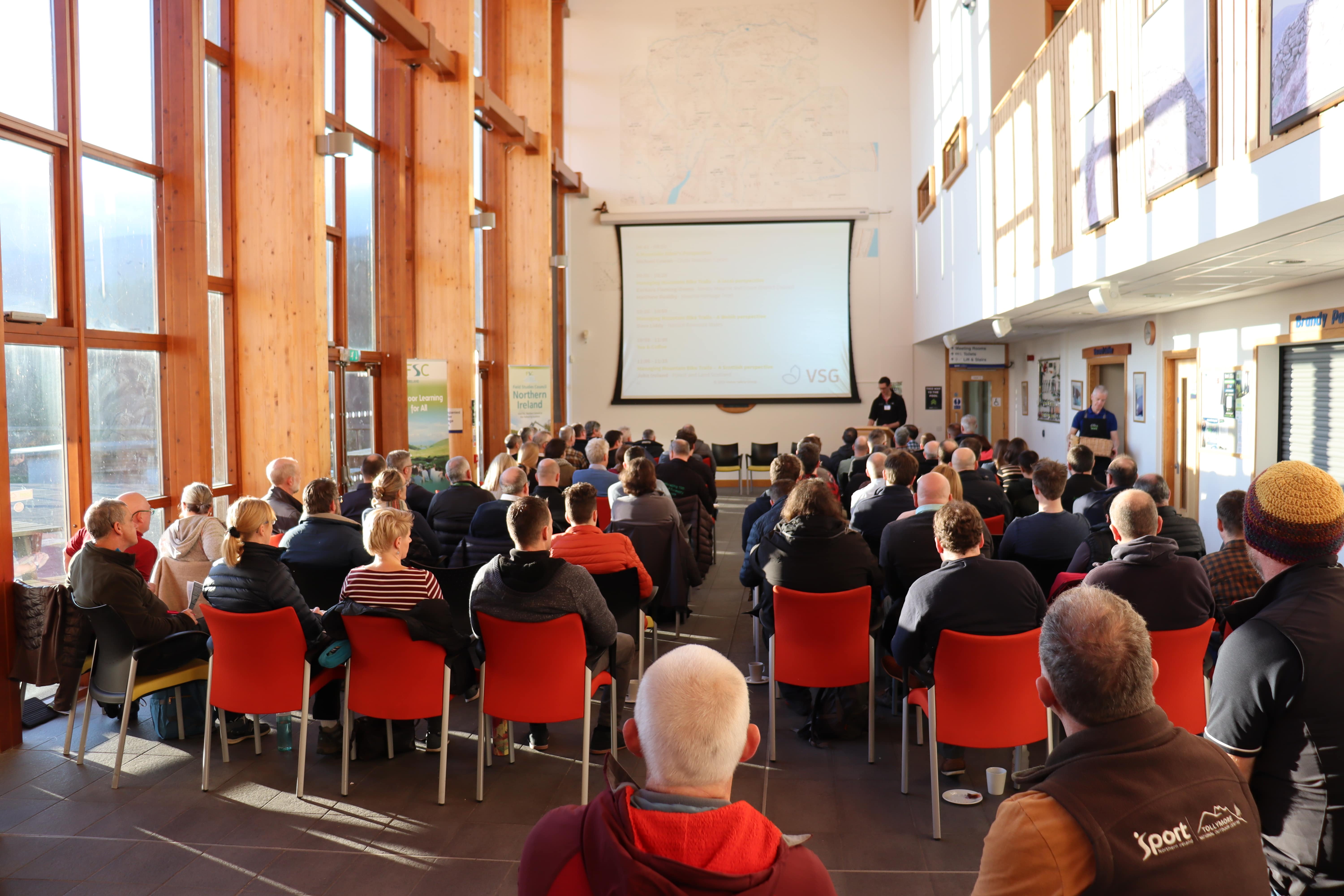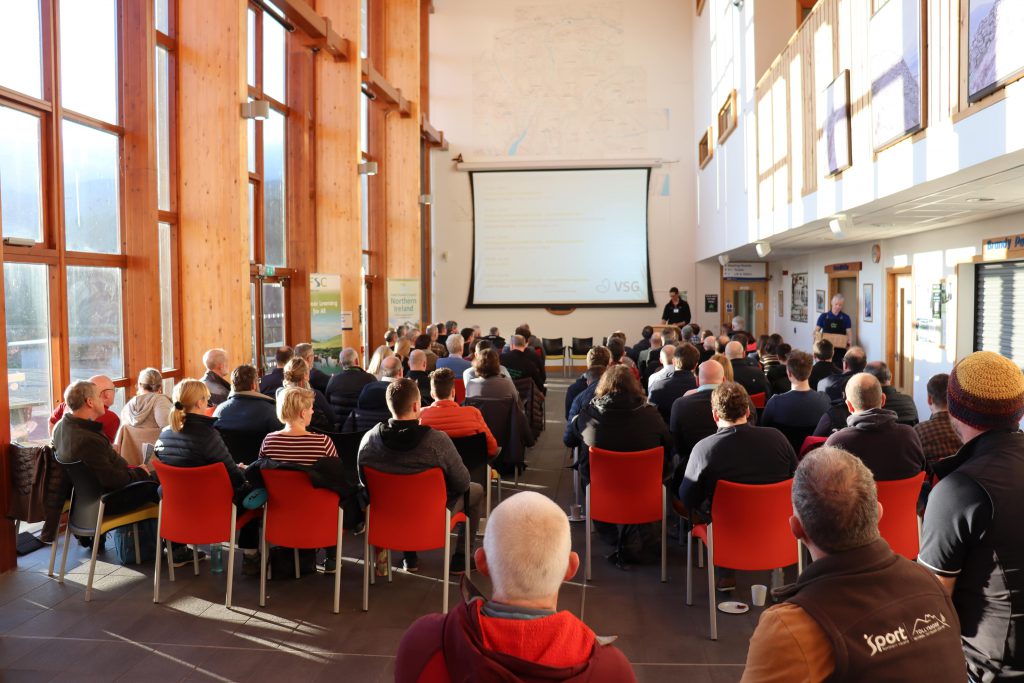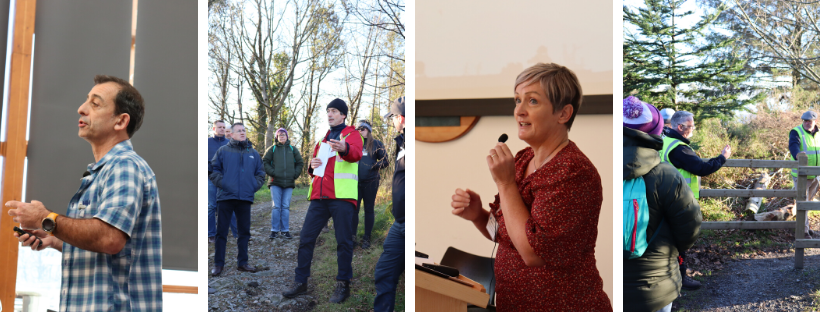
Managing Informal (Natural) Mountain Bike Trails – Key Learnings
20th January 2020
In early December 2019, Sport Northern Ireland and Outscape hosted a Visitor Safety Group Seminar at Tollymore National Outdoor Centre focusing on Managing Informal Mountain Bike Trails.
Delegates from across the United Kingdom and Ireland shared their experiences through a range of expert presentations and a site visit to Castlewellan Forest Park.
Mountain bikers are increasingly seeking new challenges and as a result there has been a growth in the number of mountain bike trails constructed without the permission of land owners / managers.
This has been heightened by modern mountain bike design and GPS tracking platforms. This has resulted in a range of challenges including multi-user conflict, creation of potentially dangerous hazards and negative environmental impacts.
The seminar was developed to:
- Gain the mountain biker’s perspective – why informal mountain bike trails are important
- Outline the issues for land owners / managers
- Outline models for engagement and managing informal trails – how land managers and mountain bikers can work together to potentially find solutions.

Workshop presentations can be found here.
Key Take-Aways
I had the pleasure of acting as MC for the day and took the following key take-aways for those managing outdoor recreation in Northern Ireland.
The challenge is not unique to Northern Ireland
Barbara Fleming-Ovens (Newry, Mourne and Down District Council) and Matthew Bushby (Mourne Heritage Trust) gave a very honest overview of the current challenges they are facing managing informal mountain bike trails within both Castlewellan and Rostrevor Forest Parks.
Bob Campbell from Natural Resource Wales (NRW) outlined that 70% of the overall trail network in the South Wales Valleys comprised of informal trails i.e. 204 km Formal vs 150 km Natural.
John Ireland from Forestry and Land Scotland (FLS) estimated there is in excess of 500km of unauthorised built trails in the National Forest Estate in Scotland.
The benefit for Northern Ireland is our industry counterparts are at a slightly more advanced stage of managing the issue. There is great expertise on the topic and a willingness to share.
Unauthorised vs Natural
Informal (unauthorised, unofficial, natural, wild, dirt) trails – these names are often used interchangeably to describe trails of this nature.
However, language is important, to mountain bikers they are ‘natural’ trails . As outlined by Michael Cowan, Brand Director at Chain Reaction Cycles to call them ‘informal’ suggests they might be an ‘add on’ or an ‘exception’ to the norm.
‘Mountain biking started on natural trails, it’s where mountain biking was invented – purpose-built trail centres came later. When comparing an artificial climbing wall to a crag you would not refer to the original form as informal!’
NRW and FLS have both recognised this softening their language from ‘Unauthorised / Informal’ to ‘Off Piste / Natural’ and ‘Wild’ respectively. This has been done in an effort to further engage with the mountain bike community – to build trust you must talk the same language!

Cat and Mouse doesn’t work
The mountain biker develops a natural trail, the land manager closes it down, the mountain biker reopens it again and so it goes on… This game of cat and mouse benefits no one. With such a high volume of staff resource being spent on closing off informal trails it is difficult to invest time in moving other areas of recreation forward. In turn, the mountain biker just wants to ride their bike and not be constantly removing obstacles from their trails.
Both NRW and FLS have developed formal agreements with mountain bike clubs and associations who now undertake management of informal mountain bike trails within the forest estate.
NRW has now adopted the approach that unauthorised trails can stay unless there are site specific circumstances why they should not.
The right thing in the right place
It’s not a ‘carte blanche’ – there are still many circumstances where natural trails are not appropriate. This is guided by risk assessments and taking cognisance of the VSG Principles. An example of the approach by NRW:
| Close it | Tinker with it /them | Let them get on with it |
| Trails Unacceptable, there are insurmountable issues. It is not expected that reasonable action can ever change this scenario significantly.
|
Trails only acceptable if modifications are made. Things must change in this scenario, but there are possible win-win outcomes possible.
|
Trails acceptable. Where only the riders themselves will be at risk; this is the ideal situation. Their risk is in line with the benefits they will derive.
|
Respect and Engagement
The fundamental caveat to all this is respect!
Formal agreements between mountain bikers / club / associations and land managers can only be formed from a foundation of good communication between parties and the need for compromise.
It is impossible to capture the need for respect and quality working relationships between all parties within formal agreements. Terminating formal agreements will not make the issues go away but it will damage the potential for future endeavours and so the current situation will just continue.
A number of proactive mountain bikers attended the seminar and it was clear that both parties gained a heightened understanding of each other’s motivations.
Key challenges for NI
Council / FSNI Relationship
The current approach for the development of recreation within Northern Ireland’s public forests is typically that local authorities undertake development and management of recreation through a licence with Forest Service Northern Ireland. This model has led to a significant development of high-quality outdoor recreation development within forests. However, the model poses significant challenges for the management of this issue. The licences are written with formal trails in mind, natural trails fall into a grey area which can lead to confusion of responsibility and inaction. In should be recognised this extra layer does not exist in Great Britain or Republic of Ireland where the land owners directly develop and manage outdoor recreation.
From cohort to club
The perception from land managers in Northern Ireland is that the majority of those mountain bikers enjoying natural trails in Northern Ireland are not part of any official association or club, any level of formality is conducted via WhatsApp, Facebook Groups etc. With the way ahead demonstrating the need for a positive relationship between a formal group and the land manager – the challenge is set for mountain bikers to demonstrate their will to formalise.
I strongly feel the seminar has opened a door to move away from the status quo. Both land managers and mountain bikers need to move their position – the question is who will make the first step?
Video Presentation – Bob Campbell & Dave Liddy, Natural Resource Wales
Blog by:
Chris Scott
Head of Operations

